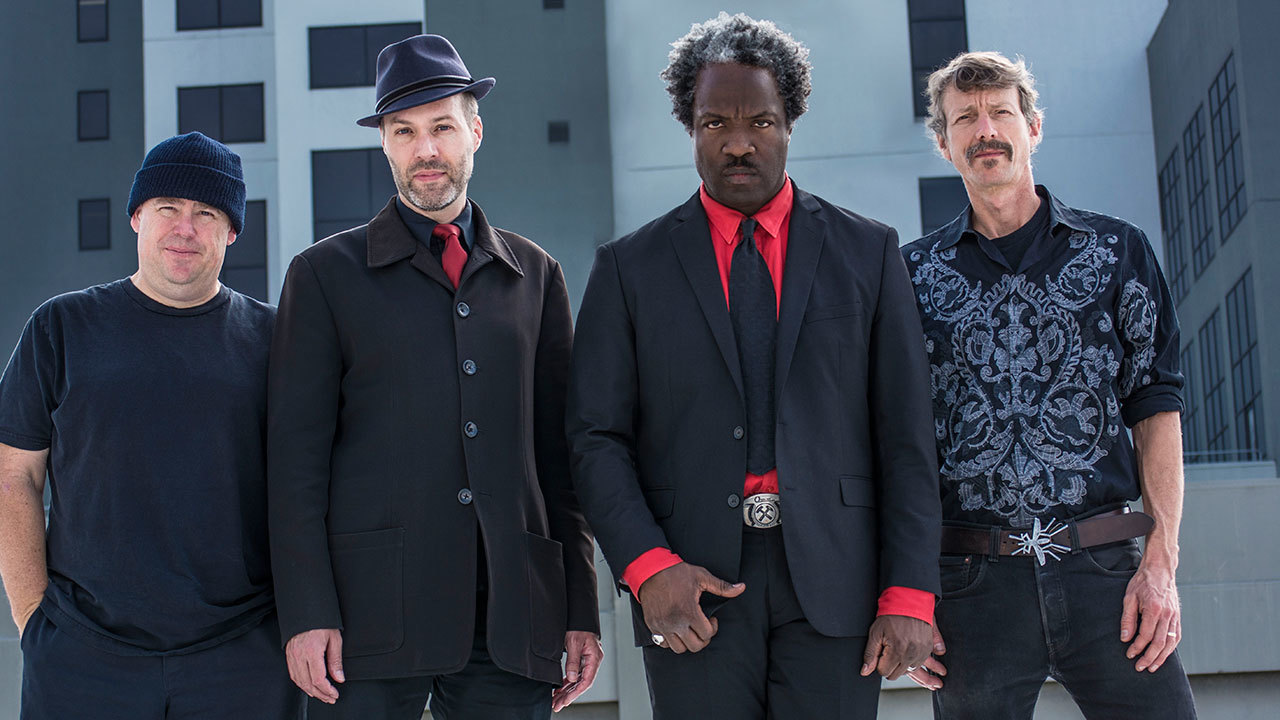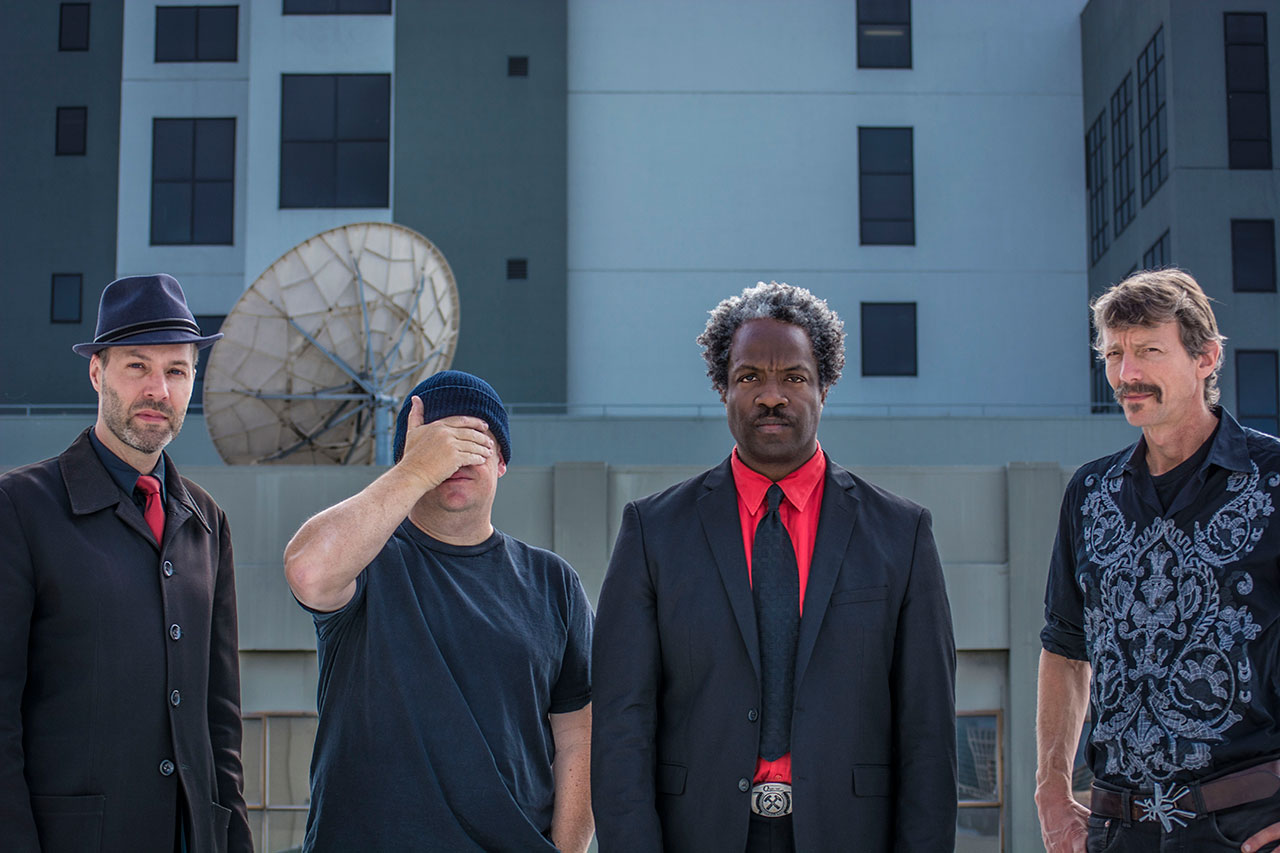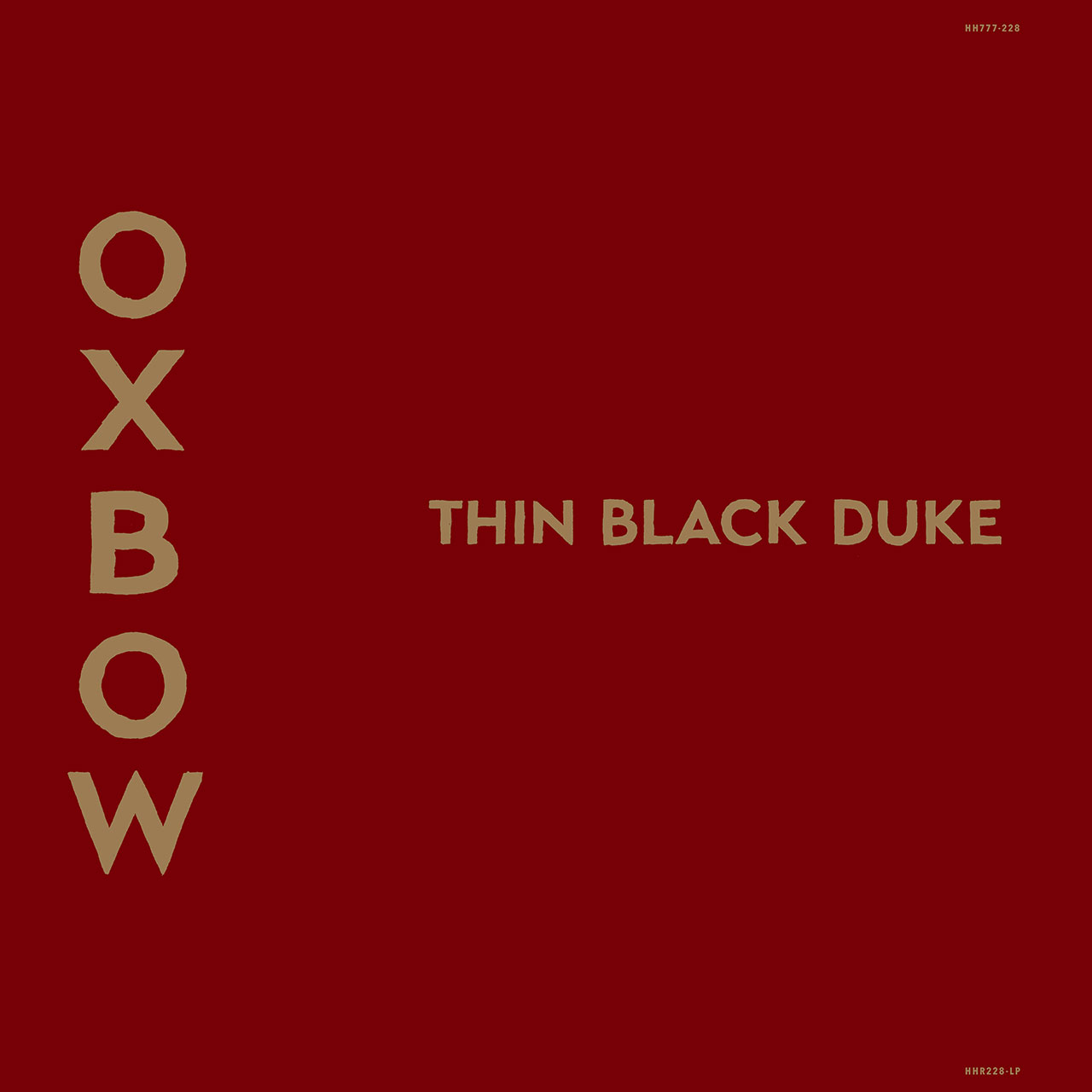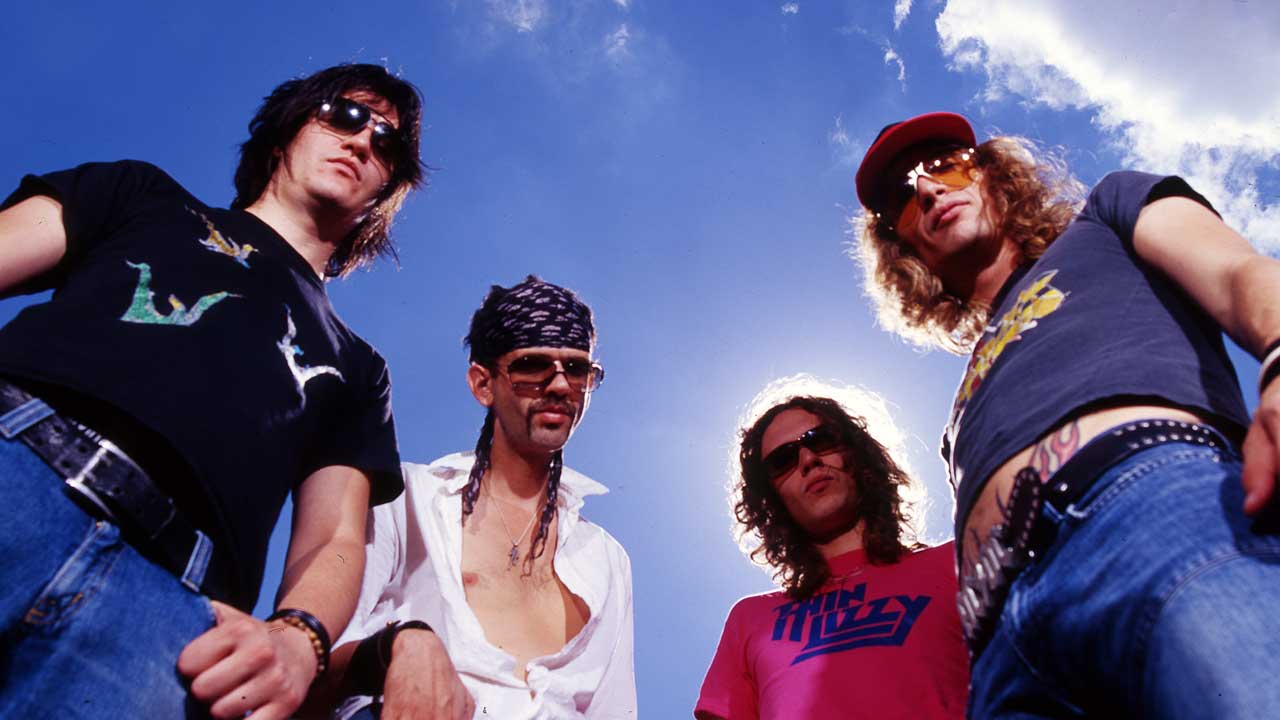Oxbow's track by track guide to new album Thin Black Duke
Californian noiseniks Oxbow give us a blow by blow account of their new album Thin Black Duke

“It wasn’t our fault, God damn it,” laughs Oxbow’s Niko Wenner when TeamRock quizzes him on the 10 year gap that preceded the noise-rock quartet’s latest record, Thin Black Duke. “Things happen quickly when they happen. The gaps, what took so long, was when nothing was happening.”
That “nothing”, according to frontman Eugene S. Robinson, included fitting in “real lives, real living, real people, time, jobs, family, kids, death, divorce,” as well as waiting on scheduling issues, mounting a crowdfunding campaign to try and help with the spiralling costs of producing the record and looking for a home for the record’s eventual release. “Aaron Turner at Hydra Head [records] should be given an award for actually caring enough to put his money where his mouth is,” says Robinson. “Everybody says they love Oxbow, but not everybody’s trying to put out an Oxbow record.”
With the record finally due for release this week, we catch up with Wenner and Robinson, along with bassist Dan Adams and drummer Greg Davis, for a track-by-track account of how Thin Black Duke came to life.
Cold & Well Lit Place
Niko Wenner: Often, at work, at lunch I walk. I was walking, and I saw in a plaza here in San Francisco [a sign for] the University of Berkeley brass band, playing outdoors, noon time. I thought, great, that’ll be interesting. It wasn’t. It was boring. I thought to myself, ‘Okay, what would be good that they would play?’ And I thought [of] what you hear on the noisy parts of Cold & Well Lit. ‘Oh, we should have two tones sliding against each other, one going up, one going down – now that would be cool, that’s what I want to hear.’ How do you make stuff? You do what you want to hear; what you want to read, what you want to see. So, I blame the Cal State Berkeley Band [laughs].
Greg Davis: For me, Niko often brings in these fantastic pieces of music, and then Dan and I do our best to ruin them and subvert them. This song resisted all my efforts to subvert it. In the end, I just gave in. That’s one of those songs – and it’s rare for Oxbow – where you just want to bob your head and tap your foot, and that was the right answer. Once I came around to that acceptance, it all fell into place for me.
Dan Adams: In a way it’s almost an easy crutch if you’ve got massive dissonance and noise and things – it’s easier to generate certain types of intensity. Some of these songs are a little bit lighter, they’re a little bit more consonant, so trying to generate that intensity might take different means. I thought one of the interesting challenges on this record was figuring out how to try to get that energy and intensity up with music which is not quite as abrasive. It was a great challenge.
Eugene S. Robinson: I think lyrically what was going on in my mind was during the entire course of my life, I, with great frequency, found myself places where not a musical dissonance but a social dissonance kicks in. The subtext for it is I’m having a hard time believing that I’m here, in this moment. It’s happened from seven years old, and in Cobble Hill Brooklyn, meeting some strangers – and I’m very sure this happened – they said “What are you doing? We’re going to some hippy’s house, you should come with us”. Three blocks over, off my block, up the stairs, hanging out with all these hippies, at some point somebody started beating someone up in the kitchen, and I was just sitting there. I didn’t feel especially disturbed. Eventually about after half an hour I just stood up and wandered out. The actual functional impetus for the song came from some a suchlike moment. Except I wasn’t seven.
The latest news, features and interviews direct to your inbox, from the global home of alternative music.
Ecce Homo
NW: The beginning of Ecce Homo is those four intervals that glue together the music for the record. January 2009 [with] my Martin D-18 that I’ve had since I was 14 years old [I thought] “Okay, I feel like playing guitar. Hmm, this is interesting, those four intervals play the song”. The only difference really [from] that evening [to what you hear on the record] was that we asked for help to make this record better, and our friend Monte Vallier – great engineer – cut it down. Other than that, the guitar part, much to my chagrin [laughs], has been exactly the same since 2009. The other parts took a long time. Greg, I remember you not finishing the drum parts until the week before recording…
GD: Yeah, which is odd, because I think that song was the first song we ever played from this record.
NW: That’s right. The songs were written in the order they appear in this record, except for this one.
GD: Yeah. So we’ve played that song for years, and it’s gone through a lot of different changes. I don’t know what that means. I think Niko is right, I probably didn’t decide what I was going to do right until the end, but I really don’t know why. We all changed the way we played it over the years. It’s an organic process.
NW: I think it’s important to note that the drum part that you ended up with I think is – I mean, I would say this – but it’s excellent, so it was sort of worth it. [Laughing] Sort of.
GD: [Laughs] Yeah. I think the only part that never changed was in the middle, that little marching cymbal and tom and drum part.
ESR: Of course, lyrically, I stole the title, not only from Nietzsche, the great book Ecce Homo, but from Pontius Pilate and ‘Behold the man’. I would say it’s introducing you to your setting. The thing is, if you go from a record like Fuckfest, where it’s very clear that we’re upset about some thing, a record like Thin Black Duke, we’ve gone from being upset about something to being disturbed about everything. I’m actually not even kidding. The occasion you sit at red lights, you look out and see something, that – if I’m not falling asleep at red lights because I’m so incredibly tired – that will move me to tears… it’s something that happens more often than I’d like.
DA: Before we leave that song, Eugene or Niko, any comments on what it was like to actually decide to change the order? I thought that was kind of an interesting thing, where in the past we’ve taken the order as something that was almost sacrosanct, and here, initially, that was the reaction. Then we thought about it and realised… wait a minute, this is the sensible thing to do.
ESR: Well, there were a couple of things for me. One, is that you can start a story any way. If I’m going to tell you the story of Goldilocks, I can say “There was a woman who was lost in the wood and she came to a cabin”. I can start with “There were three bears who lived in the woods and had a cabin”. It doesn’t really change the story very much, it just has to do with orientation. So then it resolves itself to [Joe, and I thought] you know what, he’s been in this with us now, spent the time, thought about it, we were not super-decided one way or the other, so I figured, I’m going to yield. I’ll yield to somebody who, in this instance, is maybe just far away enough to be smarter about it than I am.
NW: We keep coming back to describing the records we make as ‘cinematic’. I see that change in a cinematic way. You can have a really great opening to a film, something with energy, [something] kinetic, [that] just really pushes through. After that opening – which can be displaced from the linear story – then you have this more lyrical beginning. So it made sense to me in that way. I was very into having the linear, the music created [in the order] that [it] appears on the record but nope, we didn’t do that. Joe’s idea was great because it displaced that, and has that kind of tension of being displaced.

A Gentleman’s Gentleman
NW: The luxury in using the songs in the order that they’re written is you can say, okay, Ecce Homo [has] this lyrical melancholy, what do you do next? Well, you need something that moves. And short, I wanted something really short. But because of who we are, we ended up having that piano and just couldn’t let it go. Couldn’t let it be a two-minute rocker, had to go to piano, and it worked out better – but it’s intentionally that way.
GD: For me, I remember this song, when we started working on it, I was thinking about the first couple of Wire records. The way they put things together in this really simple, intelligent way, where everything happened as it should, when it should and everything moved forward very simply. The song started out much simpler even than it is now. It morphed away from that a little bit, which is fine, but that’s what I had in my head when we started working on this song. I think it’s worth saying here our original arrangement was actually much longer, and again our friend Monty took one of our rehearsal recordings of it and edited it down, and he was absolutely 100% correct. First time I played his edited version it was like a lightbulb going off. For this song lot of credit has to go to Monty.
NW: I would say that the important four intervals that are the glue for the record appear in what I would think is the chorus, and then also in the piano part and in the guitar melody that’s all over this piece. So, it’s there as well.
DA: Greg was talking about the bare simplicity and essential-ness of the song, and this is one where from a bassline perspective I was torn between the fact this song really probably just needs a single note pounded out over and over and over again and my desire to do different things. It’s kind of a split personality in a way, because a lot of it is close to one-note hammering, but then there’s some lovely opportunities to move around a bit more on the bass, and to kick some energy in and have it be less solidly grounded, still keeping the energy. It’s a really fun tune to try to figure out how to balance those two elements.
ESR: This is another direct lift for me. I had been messing around with these words in a live setting for a long time, but the title comes from a British movie, one of my favourite movies of all time, directed by an American ex-pat, Joseph Losey, the movie is called The Servant. There’s a line in it where one person says to the other, “I’m a gentleman’s gentleman” and the rejoinder is “And you’re no gentleman”. It’s probably one of the more potent keys to what it is I’m talking about lyrically. But of course you have to make the reference point to the movie, and if you don’t do that it’s harder to understand. A gentleman’s gentleman is typically a butler, right, a servant, but it’s much more than that in this instance.
- Buzz Osborne's guide to the greatest Melvins albums ever made
- Tool, Primus, Melvins set for California summer show
- 10 of the best metal bands from California
- California Screaming: How the California Jam banished Altamont's demons
Letter Of Note
NW: This was a song that began on electric guitar, which is really rare for Oxbow songs. The tension between the orchestral stuff, which is supposed to be in a different tempo, [is that] the tuning is different between the middle section and the outer sections. We recorded the beginning and end on to tape, slowed the tape down so it sounds deeper and out of tune with the other parts of the record, so it has that kind of a displacement and a disorientation in tuning and in pitch. Even within the middle, which is back to concert normal speed, normal pitch, the orchestral parts are out of time. It’s intentional. The music is intended to push you out of feeling comfortable.
TeamRock: Thematically it sounds like an exploration of murky relationships between emotion and materialism. Can you elaborate on those themes?
ESR: Umm, not really, outside of saying it’s that kind of thing where you’re standing on the edge of a cliff and you’re overcome with this urge to fling yourself off. There are other periods like that, where sometimes when I’m driving I start to play this kind of mind trickery where I start to panic, where I can’t drive anymore. How is it even possible that I am driving, that I’m operating this machinery? And it starts to escaladio, it starts to build and spin out of control. I guess what we’re talking out is a sort of monomania. In this instance, money is an extraction like no other for me. I can travel North of where I am right now for a few hours and take any single piece of cash I have and it will cease meaning something once I step across a border. If I step into the woods it ceases meaning something outside of maybe I’m cold and I need some combustible material. But we all in this consensus decided it’s going to be worth something, and what it’s worth is how we measure who it is that we are.
NW: When we make records, we’re trying to convey how it is we see the world, how it feels to be us, and the hope is that someone listening, in this case someone consuming what we do, can have recognition and we can share that together. So we do the best to give an experience. I was talking about the displacement, the disorientation of the music in Letter Of Note, and Eugene’s talking about the feelings that created the lyrics. People will take from that what they will. There’s a lot of melancholy, but there’s also there’s a lot of joy and it’s totally valid what you take from it – there’s a lot of elements there. But we’re conscious of the fact of trying to make the best presentation of us, of our feelings, of our worldview, and to share that with people.
ESR: Or, like Black Flag so coherently said at one point in time, I want to make you feel like you make me feel.
Host
NW: [This song is] capo-ed up. All the songs on this record are in standard tuning. I got really tired of tuning the guitar down – I love that sound, but like, enough, you know? For me, I play guitar very hard, there’s a lot of energy, and it just makes the guitar out of tune constantly. So, okay, forget it. Standard tuning, it’s easier to perform live. So this is the most studio-intensive record we’ve ever done, but the thought was how to do the songs live. Make the guitar always in the same tuning. But that gets a little mono thematic, so a capo - we raised the pitch of the guitar by one step. And other than that, yeah, it’s pretty simple.
TeamRock: The lyrics mention casino politics. What does that mean?
ESR: You tell me! We’re living in a country right now run by a casino politician. Yesterday in Freedom Park in Berkeley there were hours and hours of fist fights and people Sieg Heiling. I think that’s what we mean when we talk about casino politics.
TeamRock: Though the songs and album have been worked on for a long time, the themes seem strangely prescient.
ESR: Yeah! It’s eerie, from the David Bowie connection to having him just pass – I mean, I can’t take any credit for that [laughs] – some might make the claim that we’re artists, we’re sensitive and important [laughs]. It may be the case that stuff we were thinking about 10 years ago is coming to fruition, but as much as I like grandiose claims, I can’t make a grandiose claim like that with this one. I’m tracking things in my own life. So, in so far as I’m a product of circumstance and surroundings, maybe that’s what’s going on.
DA: One other element about Host, I think the first time Niko played it for us, and I tried to play along, there’s this section towards the end which just struck me immediately as reminding me of church bells when you’re walking around in some beautiful old ancient city, you walk around a corner you and you start hearing [bells] off in the distance, and then as you walk it gets more and more present and you hear more and more, and it’s a cacophony except everything is beautifully somehow consonant, but with all these harmonics and overtones and such. The other thing I realised is that those church bells can mean many things. It can just be that it’s 12 o’clock, or it could be a celebration, or a funeral or a wake. I love the element of this tune that it ends that way with that growing, and yet it’s not clear and can mean many different things sonically.
The Upper
NW: For me the music began with the vocal melody I guess, like the last song, Host. This was something that I was just singing to myself and then – holy cow! – the sun starts shining, I can play that on piano. The song comes from that.
TeamRock: The vocals take us back to Serenade In Red…
ESR: Ah, yeah. In that instance, when they [critics] use the word baroque, I was like “Baro..? oh, they mean The Upper”. Because, at least lyrically, I way over-wrote in Serenade In Red. If you’ve been following Oxbow since then, I’ve tried to – again with a nod to Bowie – get more economical with language. At one point [I was in the studio], and the studio guy had a book about David Bowie’s lyrics. I pick up the book, and these were lyrics I had known, but I’m reading them and I’m like… “We could be heroes, just for a day? What the fuck?” I heard the song dozens of times and loved it, but if I just wandered in and didn’t have a musical context to these words they wouldn’t mean anything to me. So what Bowie had done in a very clever way was to economise, economise, economise, and then the breath of air in the song was the music. From Serenade In Red, I guess I had to lyrically get it out of the system. [After that] I started to with each successive record get more and more economical with the language. The apotheosis of that probably being The Narcotic Story, where the songs are a winner every time. But clearly here, with The Upper, [I went] back to my ways for reason I can’t explain. It’s what it needed.

Other People
NW: It’s one of those things – just bows moving up the pitch, hearing that clear, high guitar – it changes the key again and it becomes even higher. The beautiful thing about that is that it allows the bass, Dan’s instrument, much more room and it gives the song a clarity where the guitar is out of the register of the mix and you hear everything that’s going on more clearly. This is a song we mixed in Los Angeles with Joe and he worked on it before it came into the studio. When I arrived I couldn’t believe what he’d done, the collaboration was amazing.
ESR: Lyrically I think the first person to get this, at least in print, was the guy from Metal Sucks, where he got that it was from No Exit, with the premise being that hell is essentially other people. And so these are self-conscious lifts, or we could call them breadcrumbs, lyrically, thematically. I would hope that for those who have the eyes to see, this would somehow be useful. One of the more interesting things about this song was how many times it took me to pronounce the word ‘eventuality’. It took me a really long time – I would say it is not an underestimate to say maybe 37-40 times of just that one word. Before you start laughing, you should sound that word out. You don’t think about it when you just say it, but once you start thinking about it in order to say it, it gets complicated. It was one of those moments where if it was an old 1940s movie somebody should’ve had to slap my face and say “Pull it together, man!” It was very specifically a lyrical, performative moment like that, and I don’t think it was a mistake that it was on the word eventuality.
NW: That was a really fun moment in the studio. Eugene does amazing things in the studio when he’s doing vocals, and he doesn’t need help from anyone. Sometimes we have ideas, sometimes we do work together to do shit, and that I think was that line where Greg had really interesting input, and Joe was like “Well, we could do this”, and it was a chance to kind of make the song better. It was a good moment.
The Finished Line
NW: This was one of those moments where I was about to go out, washing my hands, and – hold on, wait a minute, I’ve got an idea. I sit down with the guitar, there’s the song. It’s those four opening intervals backwards, in retrograde, looking at using those intervals to create all the music. I always want to do a lot of strings, a lot of brass – the other guys in Oxbow are like, “Okay, enough, enough, enough”. This time, Joe Chiccarelli said “Hey, you know, in that middle section, it needs something. Why don’t you arrange some brass?” And I lit up like ‘Yeah, okay, it’s not my fault!’ And so what I arrived at was a quote from Dido and Aeneas, the Purcell opera. It makes sense within the record because it’s dying, and also Dido is – the character, not the singer, let’s be straight about that [laughs]. But also the way that piece of music is quoted, in the brass, the middle section of our song, it’s constructed from a ground base, the base happens again and again and again, it’s a compositional technique. This whole record is based, as I keep saying, about using those four intervals to tie the music together. So the quotation makes sense in that way as well, because that uses a compositional technique of repetition. It turned out to fit in, and that’s the story of the music.
TeamRock: This song feels like the biggest departure on the record – lighter and brighter than what’s come before.
ESR: It’s interesting to me to hear the words that you use to describe it, because it feels like an irretrievably heavy moment to me, but that’s because lyrically I’m understanding the funereal impact of the song. It accompanies a death, but maybe it’s good that the music counters that, because my understanding of the words has affected my hearing of the music. So what you’ve done is given me a glimpse into a window with a lyric-less song, or a song where the lyrics have lesser import. I guess now that you mention it, I can look at it, or listen to it with different ears, and think ‘Oh, I guess maybe it does’. But it feels, much like the passage of life, much like the horrible closing of a door to me.
DA: In my mind, it’s a celebration. It’s a celebration of life, and part of life is death, and part of life can be a horrible death, and I think there’s still something to celebrate. I think that’s interesting. What comes out to me in the song is that it’s a pretty intense song, it’s a pretty beautiful song, and like a lot of our music I guess it says a lot of different things at the same time, which is what I really like about it.
Oxbow: "We’ve always aimed to link into the human soul, spirit and psyche"
Briony is the Editor in Chief of Louder and is in charge of sorting out who and what you see covered on the site. She started working with Metal Hammer, Classic Rock and Prog magazines back in 2015 and has been writing about music and entertainment in many guises since 2009. Her favourite-ever interviewee is either Billy Corgan or Kim Deal. She is a big fan of cats, Husker Du and pizza.

